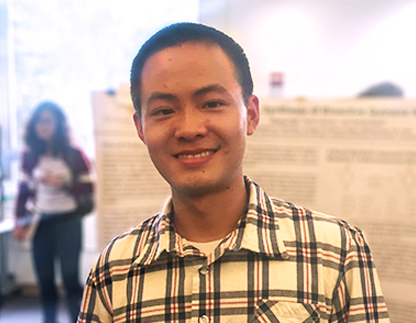I believe that your passion can be infectious, and the best way of learning is to explain something complex with simplicity and elegance.”
Henry Han (he/him)
PhD Candidate in the Department of Chemistry

Henry Han is a PhD candidate in the Department of Chemistry in the Weinberg College of Arts and Sciences. His work focuses on protein structures and their potential applications in gene therapy and medicine. Henry also serves as the supramolecular subgroup leader in the Mirkin Research Group.
How would you describe your research and/or work to a non-academic audience?
Proteins are molecules of life, but protein-protein interactions—essential in cellular signaling and diseases—are often unpredictable and complex. Using DNA as a glue, I assemble protein building blocks into higher-order and intricate structures. These protein assemblies may have natural equivalents, such as viral capsules, or are purely designed to understand fundamental biological processes, such as ligand binding. We envision that these designs could serve as probes to study biological systems and as functional materials to enable therapeutic applications, such as drug delivery and gene editing.
Tell us what inspired your research and/or work.
I am always fascinated by the diversity of life enabled through evolution, and in fact, nature is the best chemist to date. For example, artemisinin, a naturally occurring molecule produced in the plant Artemisia annua, has been widely used to treat malaria since its discovery. Going beyond the length scale of small molecules, macromolecular machines composed of proteins and nucleic acids perform essential functions within a cell. I hope that one day scientists can have capabilities similar to or beyond nature to address significant problems such as health and disease that impact society.
What do you find both rewarding and challenging about your research and/or work?
What’s challenging about my research is that experimental observations can be sometimes drastically different than expectations. On the other hand, the investigations taken to understand these puzzling and confounding results may lead to new understandings of the world around us; an accidental discovery driven by pure curiosity may have a long-lasting impact than one could possibly imagine at the time.
What did you originally want to be when you grew up?
A teacher. I believe that your passion can be infectious, and the best way of learning is to explain something complex with simplicity and elegance.
What advice would you give your younger self or someone considering a similar path?
Do your own thing.
What are you most proud of in your career to date?
I am proud that I have mentors and friends whose support, creativity, and critical thinking continue to inspire and push me to become a better scientist.
Published: August 23, 2022
If you know a graduate student, postdoctoral trainee, graduate faculty member, staff member, or a member of our TGS alumni population who would make a great candidate for our TGS Spotlight Series, please complete this brief TGS Spotlight Series Nomination Form.